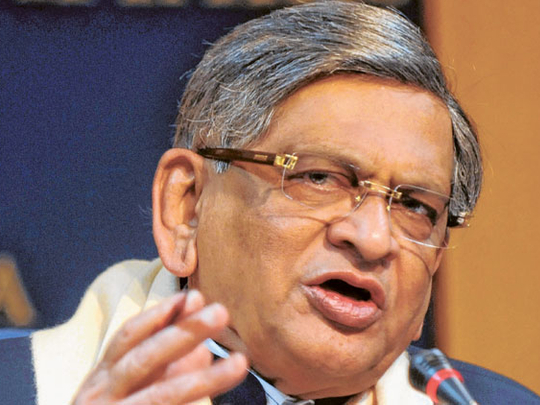
India's Foreign Minister S.M. Krishna gushes about the close "civilisational, cultural" ties his country shares with Sri Lanka. He notes how India is the biggest trading partner and source of tourists for the island nation, plus one of the largest investors. It dishes out pots of aid, including roughly $300 million (Dh1.10 billion) for 50,000 Tamils, displaced in a brutal civil war that ended in 2009, to build houses near Kilinochchi and Jaffna in Sri Lanka's north. And India is building a power station, and renovating railways and a port.
Memories in Sri Lanka of India's troubled role in the long and bitter civil war appear to be fading. Meanwhile, India, officially, does not worry about signs of its neighbour's dalliance with China.
Krishna says, India does not (any longer) meddle in the affairs of its neighbours. "We will not destabilise or divide a nation," he says firmly. The desire to ward off any resentment at India throwing its weight about the region is a fairly recent phenomenon. It may explain India's inaction in the Maldives, when an elected ally, President Mohammad Nasheed, was toppled in what looks very much like a coup.
Hawkish Indians, such as Brahma Chellaney, a foreign-affairs type in Delhi, lament that as a result India's "clout is eroded, and its ability to shape events is waning". For Chellaney, the Maldives is the latest example. Yet the cautious approach, combined with growing largesse, may win allies in the long term. Already, Sri Lankans are sounding warmer towards India. Basil Rajapakse, Sri Lanka's economy minister, talks up intimate ties. Sri Lanka's economy, growing by some 7 per cent, gets about half of all Indian investment in South Asia, and Indian banks, hotels and fund managers have been crowding south. India is helping set up industrial zones, small-business parks and factories in Tamil areas.
India is quietly vying for greater influence across South Asia. One way to do that is economic. It has offered Sri Lanka a free-trade deal in services (a deal exists already for goods). Dushni Weerakoon of the Institute of Policy Studies in Colombo says that the concessions are so generous that political pressure for a deal must have trumped economic concerns. Stitching up closer trade relations elsewhere — for example letting Bangladesh's booming garment industry export 10 million pieces duty-free to India, or bidding for a big Indian investment to extract iron ore in Afghanistan — also looks designed to win friends.
Bigger returns
A similar strategy is even at play with Pakistan, India's arch-antagonist. Recently, India's trade minister led a delegation of businessmen to Lahore. The potential returns are big. India's exports to Pakistan are surging, by over 30 per cent a year, but from a minuscule base. The Confederation of Indian Industries in Delhi says that if basic tariffs are cut, bilateral trade, now just $2.7 billion a year, could easily reach $10 billion by 2015. If all barriers were removed, trade in cars, chemicals, cotton and other goods could be worth $25 billion a year.
To lessen resentment in the region, India is getting more active as an aid donor. A decade ago that largely meant paying for Bhutan to build big hydropower plants that exported energy back to India. Today it means big, soft loans, China-style, so neighbours can buy capital goods. Bangladesh, where the Awami League government has close relations with India, recently got a cheap $1 billion loan for river dredgers and railway stock from India. India also scatters small grants among villages in Nepal, to cut poverty and generate goodwill. It is one of the five biggest donors to Afghanistan, where it is training police officers. And it spends $100 million a year teaching some 5,500 foreign civil servants, many from the region, in its academies.
India is building up its neighbourhood diplomatic presence too. Since 2000 it has opened four new consulates in Afghanistan, two more in Sri Lanka and an extra one in each of Bhutan, Nepal and (to come) Pakistan.
Others spell out concerns more explicitly. At a seminar about the Indian Ocean held in Chennai late last year, participants noted that China has a legitimate interest in keeping its maritime trade routes open and secure. But that is bound to mean that China has a growing interest in India's near-abroad. India, one participant said, had to prepare for "some kind of adversarial relationship" with China. "We are not Chinaphobic" said an ex-submariner, "but it is right to pay attention to China." India had better make more friends now, in other words, before it is too late.











